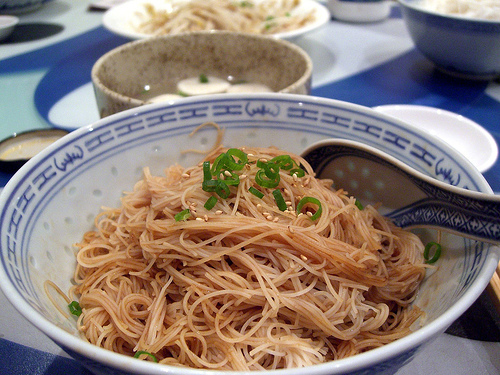
Sales of Non-GMO Project verified products growing by 27%; sales topped $450 million in 2010
With increasing consumer concerns over genetically modified foods, sales of Non-GMO Project Verified products are growing—fast. According to natural food market research firm SPINS, Non-GMO Project verified product sales grew 27% over the past year, making it the fastest growing segment in the natural and organic food industry. In addition, Non-GMO verified product sales totaled $450 million in 2010.
The 27% growth rate far exceeds the growth of other natural/specialty food categories including organic (9%), pre/probiotic (17%), fair trade (16%), gluten-free (11%), and others.
But in terms of sales volume, Non-GMO Project verified ranks seventh among 10 product categories, falling well below organic ($7.4 billion), gluten-free ($6.6 billion), whole grain ($4.6 billion), soy food ($3.0 billion), hormone-free ($2.8 billion), and pre/probiotic ($2.6 billion). The figures are for sales in natural food stores, specialty/gourmet supermarkets, and conventional supermarkets/mass retailers.
Nature’s Path is top-selling brand
SPINS tracks ongoing consumer response to the increasing availability of Non-GMO Project verified products. Baby Food (+10%) and Refrigerated Non-Dairy Beverages (+5%) are two categories that have seen considerable expansion of Non-GMO Project verified products on the shelf across the combined conventional supermarket and natural and specialty food store channels.
The best-selling Non-GMO Project verified product categories are cold cereals ($62.7 million) and refrigerated non-dairy beverages ($61.1 million). These two categories combined account for 28% (14% each) of all Non-GMO Project verified product sales.
Other Non-GMO Project verified product categories also include: beans, grains, and rice; shelf-stable non-dairy beverages; teas; frozen fruits and vegetables; yogurt and kefir; condiments; frozen desserts; salsas and dips; entrees and mixes; rice cakes; and cookies and snack bars.
The top-selling Non-GMO Project verified brand is Nature’s Path Organic, which has an 18% share of the market followed by Silk with 10% and Lundberg Family Farms and RiceSelect both with 9%.
Silk’s non-GMO verified products are seeing the fastest sales growth rate at 49%.
According to Megan Westgate, executive director of the Non-GMO Project, there are now more than 4000 products from 206 brands going through the Project’s verification program. Of those, about 1,700 are verified and eligible to display the Non-GMO Project Verified seal.
“Emerging from grassroots stage”
In a presentation given at the recent Natural Products Expo West, Michael Movitz, SPINS vice president of business development, said that the Non-GMO product category is “emerging from grassroots stage with many unknowns in the GMO battle, but GMO is a food system threat that will galvanize consumers more than the National Organic Program effort did.”
Movitz also predicts that non-GMO is a lifestyle-based issue that will follow a similar path to that of the gluten-free product category, which is the second leading natural/specialty product category behind organic.
Here are some other points Movitz discussed:
- Third-party (non-GMO) certification and industry self-regulation and policing are essential while the federal battle over GMOs and labeling wages
- The focus today in the non-GMO market is on protection and verification, but it will quickly need to include consumer messaging
- Many “natural” items currently contain GMOs and it will take years to transition to non-GMO sources for these products and ingredients. Marketers and retailers must use caution in messaging or they can implicate themselves
- Consistency of information and certified products online and on-shelf will take time. Identification of non-GMO on labels will also need to be easy for consumers, i.e., a credible, publically recognized seal
- There is much consumer confusion around organic vs. natural. Non-GMO is a tangible attribute that can resonate more clearly for consumers.
Overall, consumer response to Non-GMO Project Verified products has been positive and according to Mary Ellen Lynch, SPINS’ director of consumer insights, “will continue to grow as consumer awareness and understanding of food safety issues, including GMOs increases.”
Ken Roseboro is editor of The Organic & Non-GMO Report, www.non-gmoreport.com. He can be reached at ken@non-gmoreport.com.








Well, a good PR campaign will do that. It really isn’t too surprising, and non-GMO foods will continue to rise for many years. The level of science education and literacy in this country stinks. It is no surprise that people see movies like Splice and decide that they don’t want DNA in their food. Combine that with a marketing campaign based on fear & capitalizing on the fact that most people don’t understand the science behind genetic engineering, and you’ve got a recipe for success and the ever important profit. This anti-GMO thing is no different than the anti-vaccine thing, and judging by the measles outbreaks this year we can see that line of thought works out real well. Every time I see this stuff, I can’t help but think of when Carl Sagan said ‘We live in a society absolutely dependent on science and technology and yet have cleverly arranged things so that almost no one understands science and technology. That’s a clear prescription for disaster.’ Oh well, I guess if a dance instructor who thinks he can literally fly says GMOs emit evil rays, we better listen to him, ’cause we all know that everyone who reads science books is out to get us, amirite?
Interesting article. There are all sorts of foods on the market, some better for my health than others. I prefer to have a choice and the information I need to base my choice on than to blindly trust others to take care of my welfare and that of environment in which I live. Even these GMO-free products can still have ingredients that I cannot or choose not to eat, such as sugars, certain fats or gluten (to which I am sensitive), or environmental impacts, such as excess packaging, for instance. Knowledge is power and assists me in looking after myself in the best way I know! I decide where my body goes.